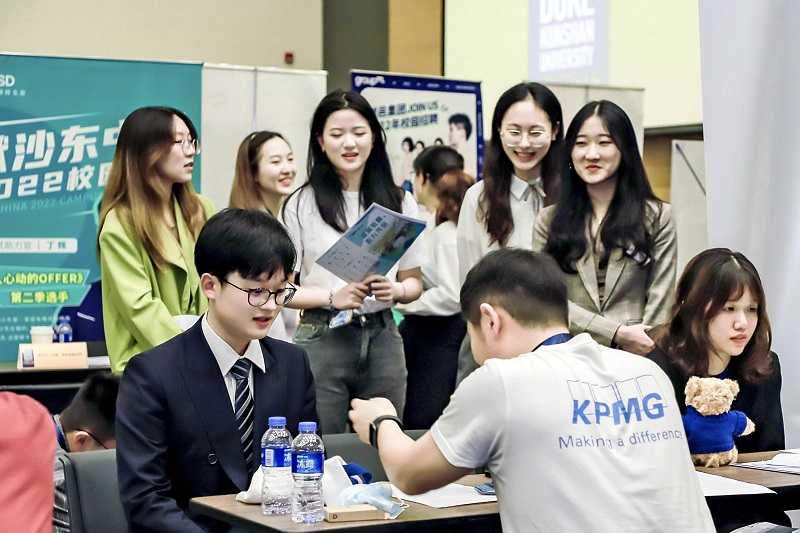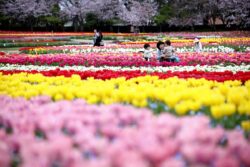CCP on shaky ground ahead of party congress / China’s sluggish economy brings jobless problem for recent graduates

Students attend a job fair at a university in China’s coastal Jiangsu Province in October 2021.
6:00 JST, September 13, 2022
The Chinese government is facing a number of challenges as it prepares for the Communist Party Congress next month. This is the final installment in a three-part series analyzing the issues.
***
Financial players in Shanghai and Hong Kong are closely watching China’s “National Team” — not athletes representing the nation in global sporting events, but state-backed investors such as pension funds and public funds of government-affiliated institutions. They invest the equivalent of tens of trillions of yen mainly through the stock market.
Unlike public funds in Japan, Europe and the United States, which retain a certain degree of independence and make decisions on purchases and sales, the National Team is said to be “under the strong influence of the Communist Party,” a financial expert said.
The National Congress of the Communist Party of China, held every five years, is expected this autumn, and Hong Kong-based Kenji Hashizume of Sumitomo Mitsui DS Asset Management Co. draws on the following market adage: In order to create an economic boom, stock prices in the Shanghai market rise in the year of a Chinese Communist Party congress.
Looking at the year of the six congresses from 1992, the Shanghai market has rallied with an average gain of 48% on five occasions. The exception was in 2002 during the tech bubble collapse. The rises in stock prices have been apparently propped up by the National Team.
Yet this year, the situation is different. Although the Shanghai stock index is hovering under 3,300, which is more than 10% below the level at the beginning of the year, “there is still no sign of movement by the National Team,” according to a market participant in Shanghai.
Political target
The legitimacy of one-party rule by the Chinese Communist Party is grounded in economic growth that brings prosperity to the people. Above all, the most important indicator is the gross domestic product growth rate target set at the National People’s Congress every March.
A GDP target rate is only a forecast in developed nations, but in China, it is more of a political goal to be achieved. Should the target not be met, criticism of the administration of that time could increase.
Chinese President Xi Jinping’s leadership has thus painstakingly worked to achieve the target by setting a range of “6-6.5%” or “6% or more” in the past few years when an economic slowdown has been obvious.
The GDP growth target of “around 5.5%” announced by Chinese Premier Li Keqiang at this year’s National People’s Congress was considered from the outset to be “considerably ambitious,” according to a Chinese economist.
With the two-month-long lockdown of Shanghai as an additional factor, the GDP for the April-June period announced on July 15 showed a sharp slowdown to 0.4% growth.
Four days later, Li said at an international conference, “China won’t roll out massive stimulus, issue an excessive amount of money or overdraw the future for an overly high growth target.”
The market took his remarks as a de facto giving-up of China’s GDP target of around 5.5% with just under half the year remaining.
“Xi has solidified his administration to the point where there is no need to overly stage high growth,” said Chinese economy specialist Prof. Tomoo Marukawa of the University of Tokyo.
When looking at the regime’s footing, however, one can all but hear the squeaking and straining of society.
Impacting young people
A 23-year-old woman who graduated from a university in China’s northeastern Jilin Province in June finally obtained a job recently after failing to be selected by more than 40 companies. The non-regular job will last only one year and pays her a monthly salary of 1,900 yuan (¥39,000), barely enough to live on.
“When I think about my future, I feel anxious,” she said.
About 60% of her 27 classmates graduated without a job.
The Chinese government announced in spring that it will provide young job seekers with 1 million internship openings to help them find employment. The woman benefited from this policy. Such a measure alone was acutely insufficient, however, given that the number of college graduates this year surpassed 10 million for the first time, reaching 10.76 million.
China, like Western nations, does not employ new graduates all at once as in Japan, and thus the economic downturn will affect the younger generation first.
In July, the unemployment rate in China was 5.4%, but for ages 16-24 it was 19.9%. The rate for this age group has been renewing the record high for four consecutive months.
Besides employment figures, an indicator of social stability is inflation, which was at 2.7% in July the highest increase in two years, only intensifying the sense of a burden on the public.
Should the novel coronavirus outbreak spread again and major cities become locked down, the growth rate could fall below 4%, rather than hit the around 5.5% target.
Young people are likely to direct their frustration and anger toward the government, a lesson the party learned 33 years ago during the Tiananmen Square incident, when inflation triggered social unrest.
Nevertheless, the Xi administration, which is losing control of the economy at the moment, has yet to show any prospects for the launch of an unprecedented third term seen as a certainty.





